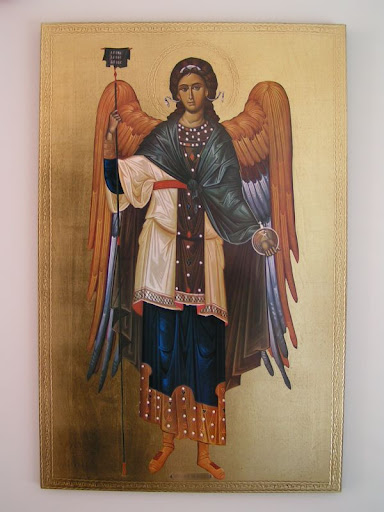VIVA CRISTO REY!
Do watch the trailer for the upcoming movie "Cristiada" and spread the word!



"Gregory the Great, a Roman by birth, was son of the senator Gordian. He applied early to the study of philosophy, and was entrusted with the office of praetor. After his father's death he built six monasteries in Sicily, and a seventh, under the title of Saint Andrew, in his own house in Rome, near the basilica of Saints John and Paul, on the hill Scaurus. In this last named monastery, he embraced the monastic life, under the guidance of Hilarion and Maximian, and was, later on, elected abbot. Shortly afterwards, he was created Cardinal-Deacon, and was by Pope Pelagius sent to Constantinople, as legate, to confer with the emperor Constantine. While there, he achieved that celebrated victory over the patriarch Eutychius, who had written against the resurrection of the flesh, maintaining that it would not be a real one. Gregory so convinced him of his error, that the emperor threw his book into the fire. Eutychius himself fell ill not long after, and when he perceived his last hour had come, he took between his fingers the skin of his hand, and said before the many who were there: 'I believe that we shall all rise in this flesh.'"...Father of the Christian people! Vicar of the charity, as well as of the authority of Christ! O Gregory, vigilant Pastor! the Church, which thou hast so faithfully loved and served, turns to thee with confidence. Thou canst not forget the flock, which keeps us such an affectionate remembrance of thee; hear the prayer she offers thee on this thy solemnity. Protect and guide the Pontiff, who now holds the place of Peter, as thou didst; enlighten and encourage him in the difficulties wherewith he is beset. Bless the hierarchy of the pastors, which has received from thee such magnificent teachings and such admirable examples. Assist it to maintain inviolate the sacred trust of faith...God chose thee as the regulator of the divine service, the holy liturgy; foster, by thy blessing, the zeal which is now rising up among us for those holy traditions of prayer, which have been so neglected; teach us the long forgotten secret, that the best way of praying is to use the prayers of the Church. Unite all Churches in obedience to the apostolic See, which is the ground and pillar of faith, and the fountain of spiritual authority...."
"On his return to Rome, he was chosen Pope, by unanimous consent, for Pelagius had been carried off by the plague. He refused, as long as it was possible, the honour thus offered him. He disguised himself and hid himself in a cave; but he was discovered by a pillar of fire shining over the place, and was consecrated at Saint Peter's. As Pontiff, he was an example to his successors by his learning and holiness of life. He every day admitted pilgrims to his table, among whom he received, on one occasion, an angel, and, on another, the Lord of angels, who wore the garb of a pilgrim. He charitably provided for the poor, both in and out of Rome, and kept a list of them. He re-established the Catholic faith in several places where it had fallen into decay. Thus, he put down the Donatists in Africa, and the Arians in Spain; and drove the Agnoites out of Alexandria. He refused to give the pallium to Syagrius, bishop of Autun, until he should have expelled the Neophyte heretics from Gaul. He induced the Goths to abandon the Arian heresy. He sent [Saint] Augustine [of Canterbury] and other monks into Britain, and, by these learned and saintly men, converted that island to the faith of Christ Jesus; so that [Saint] Bede truly calls him the Apostle of England. He checked the haughty pretensions of John, the patriarch of Constantinople, who had arrogated to himself the title of bishop of the universal Church. He obliged the emperor Mauritius to revoke the decree, whereby he had forbidden any soldier to become a monk."
"He enriched the Church with many most holy practices and laws. In a Council held at St. Peter's he passed several decrees. Among these, the following may be mentioned: That in the Mass the Kyrie eleison should be said nine times; that the Alleluia should always be said, except during the interval between Septuagesima and Easter. That these words should be inserted in the Canon: Diesque nostros in tua pace disponas (And mayst thou dispose our days in thy peace). He increased the number of processions (litanies) and stations, and completed the Office of the Church. He would have the four Councils, of Nicea, Constantinople, Ephesus, and Chalcedon, to be received with the same honour as the four Gospels. He allowed the bishops of Sicily, who, according to the ancient custom of their Churches, used to visit Rome every three years, to make that visit once every fifth year. He wrote several books; and Peter the deacon assures us, that he frequently saw the Holy Ghost in the form of a dove resting on the head of the Pontiff, while he was dictating. It is a matter of wonder that, with his incessant sickness and ill health, he could have said, done, written, and decreed, as he did. At length, after performing many miracles, he was called to his reward in heaven, after a pontificate of thirteen years, six months and ten days; it was on the fourth of the Ides of March (March 12), which the Greeks also observe as a great feast, on account of this Pontiff's extraordinary learning and virtue. His body was buried in the basilica of Saint Peter near the secretarium."
